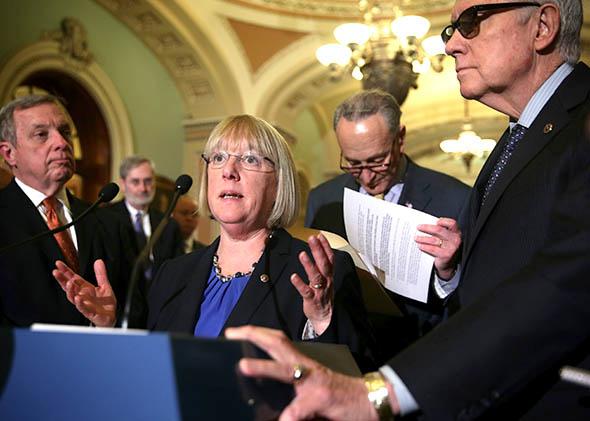In Washington, there is a cottage industry of progressives who want Elizabeth Warren to do something besides represent Massachusetts in the Senate. For the past year, that something has been a presidential run. Every few months, she’s asked if she’s running for president, and each time, she says no. Now, pro-Warren progressives have a new option. On Friday morning, Senate Minority Leader Harry Reid announced his retirement. Almost immediately, progressive groups pushed Warren for the job.
“If Elizabeth Warren doesn’t run for president, she should definitely run for leader of the Senate,” said a spokesman for Howard Dean’s Democracy for America in an interview with Greg Sargent of the Washington Post. “The election for Senate leader is not going to be a slam dunk for any early front-runner, especially someone like Sen. Schumer. He’s closer to Wall Street while the Wall Street wing of the party is dying and the Elizabeth Warren wing is rising.”
Likewise, said the Progressive Change Campaign Committee in a statement, “There will likely not be a coronation to replace Harry Reid, and Elizabeth Warren is right up there with others as someone who would be taken very seriously. … He’s the definition of a leader, and that’s why her colleagues and millions of Americans respect her and are inspired by her rise.”
The thinking is that Warren could bring her populism to the top of the Senate, where she could challenge Republicans and help position the party away from Wall Street. It’s not a bad theory of change. But it’s wrong.
Yes, a Senate leadership position comes with important influence and visibility. But it also comes with constraints. As minority leader, Warren would represent all Senate Democrats, from conservatives such as Sens. Joe Manchin and Heidi Heitkamp to moderates such as Sen. Mark Warner and liberals like herself. By definition, this means she’d have to moderate her rhetoric to build coalitions, protect relationships, and guide her caucus into byzantine fights over procedure and legislation. Minority leader, in other words, is a place for consensus, not conflict.
It’s not a place for ideological leaders who try to pressure the party away from its mainstream. A Warren who leads the Democrats in the Senate isn’t a Warren who, for example, could derail a White House pick for the Treasury on the basis of his Wall Street ties. As soon as she took the position, she would lose her voice as a vocal and influential liberal, lest she alienate her colleagues and fracture her caucus. Reid’s trajectory is instructive: He entered office as a pro-life Democrat and will leave it as operationally pro-choice, a result of his place in leadership.
Warren is best where she is: a valuable and influential senator who pressures the party from the left. No, it doesn’t come with a title, but it isn’t a small thing. In his eight years in the Senate, South Carolina’s former Sen. Jim DeMint was hugely powerful as an ideological leader, using his base in the conservative movement—and later, the Tea Party—to pull Republicans to the right during the 2012 presidential election. He enforced ideological discipline, and it worked. Warren doesn’t have to lead the Democrats—or run for president—to make the party more liberal. She can build power from the outside.
If liberals want someone to lead Senate Democrats, they should look to longtime Washington Sen. Patty Murray, who is the fourth-ranking Democrat in the caucus. She’s the dark horse in the race—behind New York Sen. Chuck Schumer, who has been endorsed by Reid as well his potential competitor, Illinois Sen. Dick Durbin—and has a solid record of progressive lawmaking, strong fundraising, and legislative savvy; in the last year, she’s negotiated a budget agreement with Rep. Paul Ryan and won a filibuster-proof majority for paid sick leave. She’s not perfect—some liberals will look askance at her tight connections to defense contractors and other big businesses—but compared with Schumer and his tight ties to Wall Street, she’s a vast improvement.
